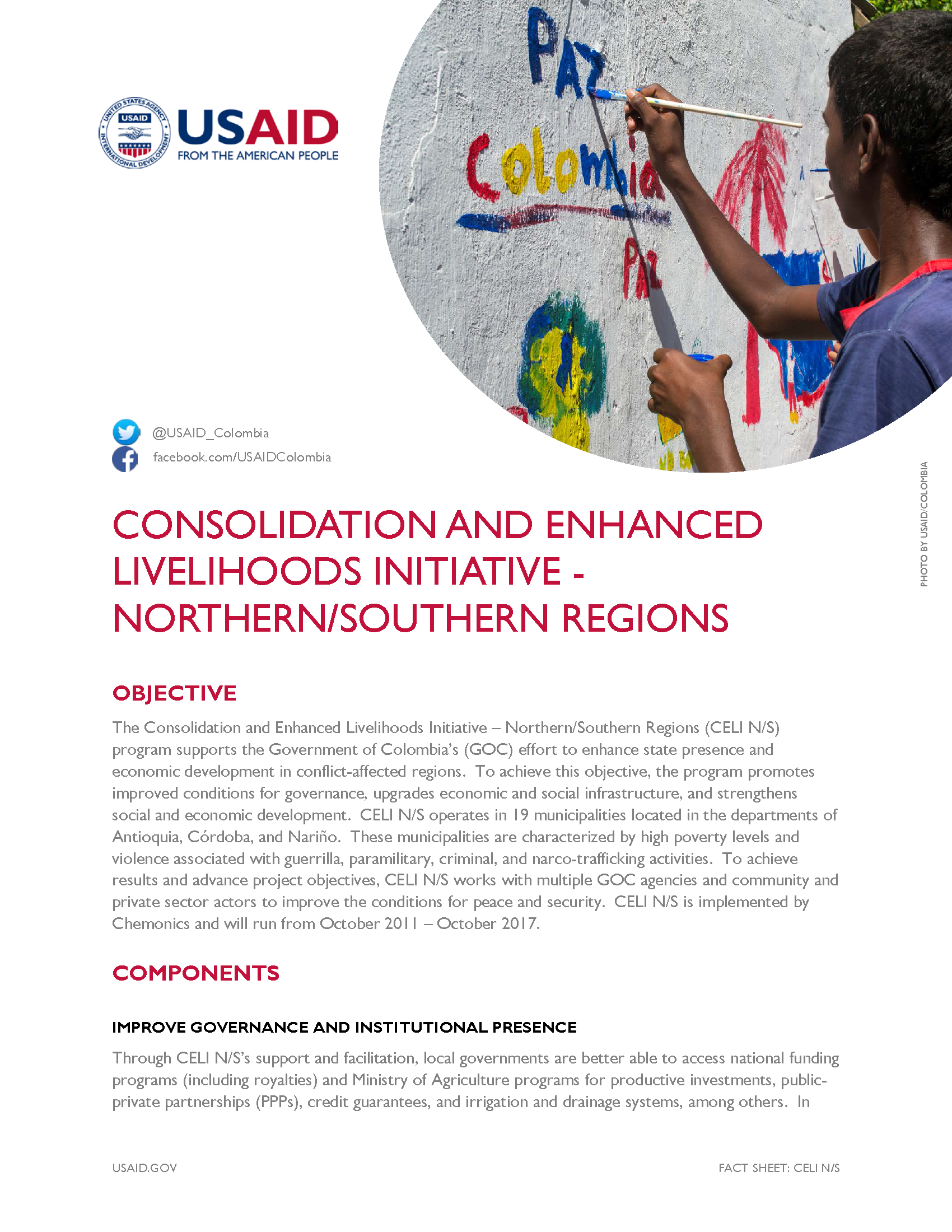OBJECTIVE
The Consolidation and Enhanced Livelihoods Initiative – Northern/Southern Regions (CELI N/S) program supports the Government of Colombia’s (GOC) effort to enhance state presence and economic development in conflict-affected regions. To achieve this objective, the program promotes improved conditions for governance, upgrades economic and social infrastructure, and strengthens social and economic development. CELI N/S operates in 19 municipalities located in the departments of Antioquia, Córdoba, and Nariño. These municipalities are characterized by high poverty levels and violence associated with guerrilla, paramilitary, criminal, and narco-trafficking activities. To achieve results and advance project objectives, CELI N/S works with multiple GOC agencies and community and private sector actors to improve the conditions for peace and security. CELI N/S is implemented by Chemonics and will run from October 2011 – October 2017.
COMPONENTS
Improve Governance and Institutional Presence
Through CELI N/S’s support and facilitation, local governments are better able to access national funding programs (including royalties) and Ministry of Agriculture programs for productive investments, public-private partnerships (PPPs), credit guarantees, and irrigation and drainage systems, among others. In support of the peace process, the program supports the Colombian government and conflict-affected communities to work together to improve tertiary roads, economic development, confidence-building, and education for peace.
Foster Economic Development
CELI N/S works to facilitate economic growth in marginalized areas by increasing access to technical assistance for small-scale farmers, and establishing and strengthening commercial partnerships with private sector actors. CELI N/S forges commercial partnerships to reduce economic isolation in conflict-affected areas by helping small, formerly isolated producers, reach larger markets. CELI N/S also works to increase access to loans and other financial services in rural areas, particularly through innovative financing mechanisms.
Strengthen and Build Social Capital and Civic Capacity
CELI N/S supports a variety of activities that build citizens’ capacity to fully participate in local decision-making, an important alternative to the organized criminal groups that have historically controlled rural areas. By strengthening women’s organizations, sponsoring self-help initiatives, reinforcing values of good citizenship, forming networks and umbrella organizations that represent diverse populations, working with Afro-Colombian and indigenous collective territories, and supporting youth groups and victims organizations, CELI N/S strengthens the rural population’s commitment to licit economic activity and a culture of legality.
Upgrade Economic and Social Infrastructure
CELI N/S, in conjunction with municipal governments, provides partial funding to improve rural connectivity by repairing vital infrastructure–river docks, pedestrian bridges, tertiary roads, markets, and collection centers, among others. The community undertakes the management and implementation of the infrastructure projects administering funds and providing much of the labor. This community-led methodology enhances transparency and accountability for use of public funds via oversight committees consisting of community members and civil society actors. CELI N/S also facilitates the development of community-municipal partnerships for tertiary road maintenance and improvement.
RESULTS
- Leveraged US $192,655,562 in public and private funds with project resources, for a ratio of US $2.69 in public and private sector financing leveraged for every dollar of project funds.
- Supported US $35,094,741 in sales of products and services from marginalized regions, of which US $1,094,367 were generated from exports.
- Completed 461 infrastructure works using participatory, community-based methodologies.
- Supported 42,767 people in joining local savings and loans groups, of which 71 percent were women, mobilizing US $11,334,724 in savings.
- Formalized 4,679 properties with official titles, of which 1,349 belong to women.
- Formed 14 public-private alliances.
- Assisted a total of 146,528 people, of which 54 percent were women, 21 percent Afro-Colombian, and 3 percent belonging to indigenous groups.








Comment
Make a general inquiry or suggest an improvement.